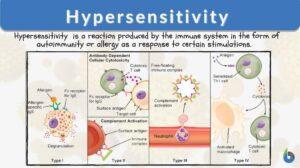Search Results for: sensory cell
Sensory cell
sensory cell A cell in the peripheral nervous system that receives afferent (sensory) input; sensory receptor... Read More
Afferent Nerve
Afferent Nerve Definition The word ‘aferent’ means "steering or conducting something towards a destination". The... Read More
Nervous tissue
Nervous Tissue Definition Nerve cells (or neurons) and their associated cells, such as neuroglia cells, make up nervous... Read More
Homeostasis
Homeostasis is the tendency not to stray from the range of favorable or ideal internal conditions. Such conditions must be... Read More
Sensory Systems
A sensory system is a part of the nervous system consisting of sensory receptors that receive stimuli from the internal and... Read More
Sensory neuron
Definition noun, plural: sensory neurons A type of neuron that transmits sensory nerve impulses Supplement The neurons are... Read More
Centrosome
Centrosome Definition What is a centrosome? The centrosome is considered to be the main microtubule-organizing... Read More
Differentiation
Differentiation in biology is the process where less specialized cells undergo changes to develop specialized structures and... Read More
Nervous System
THE is the most complicated and highly organized of the various systems which make up the human body. It is the... Read More
Thermoreceptor
Definition noun, plural: thermoreceptors The sensory nerve ending in a sensory cell sensitive to changes in temperature... Read More
Neural Control Mechanisms
Nerve cells called neurons generate electric signals that pass from one end of the cell to another and release chemical... Read More
Interneuron
Definition noun, plural: interneurons (1) Any local circuit neuron of the central nervous system that relays impulses... Read More
Antecubital fossa
Antecubital Fossa Definition The antecubital fossa or the cubital fossa is the triangular-shaped hollow depression between... Read More
Hypersensitivity
Hypersensitivity Definition Hypersensitivity is the exaggerated immune response to protect the human from foreign bodies... Read More
Integumentary system
Integumentary System Definition The integumentary system is the outermost layer of the body. The animal body, in... Read More
The Human Nervous System
The nervous system is essentially a biological information highway, and is responsible for controlling all the biological... Read More
Dorsal root ganglion
Definition noun, plural: dorsal root ganglia (neuroanatomy) The ganglion on the dorsal root of every spinal nerve. It is... Read More
Smooth muscle
The smooth muscle can be described as a type of muscle in the human body that is non-striated and involuntary in action.... Read More
Equilibrium
Equilibrium Definition In Biology Equilibrium refers to the state of balance and stability. In biology, equilibrium is... Read More
Positive feedback
Positive Feedback Definition Each mechanism of the body like temperature, blood pressure, and levels of specific nutrients... Read More
Actions of Caffeine in the Brain with Special Reference to Factors That Contribute to Its Widespread Use
IV. Actions of Caffeine on Brain Functions and BehaviorHaving discussed the molecular and neuronal actions of caffeine,... Read More
Chemoreceptor
Definition noun, plural: chemoreceptors (1) A sensory nerve cell or sense organ, as of smell, or taste, that are able to... Read More
Myelinated nerve
Definition noun A nerve cell in which the axon is surrounded by a layer of Schwann cell membranes of myelin... Read More
Merkel disk receptor
Definition noun A single sensory nerve ending characterized by a terminal cuplike, expanded tip that is in contact with the... Read More























![Biology n., [baɪˈɑlədʒi] Definition: scientific study of life](https://www.biologyonline.com/wp-content/uploads/2021/12/biology-definition-and-branches-of-biology-300x168.jpg)





